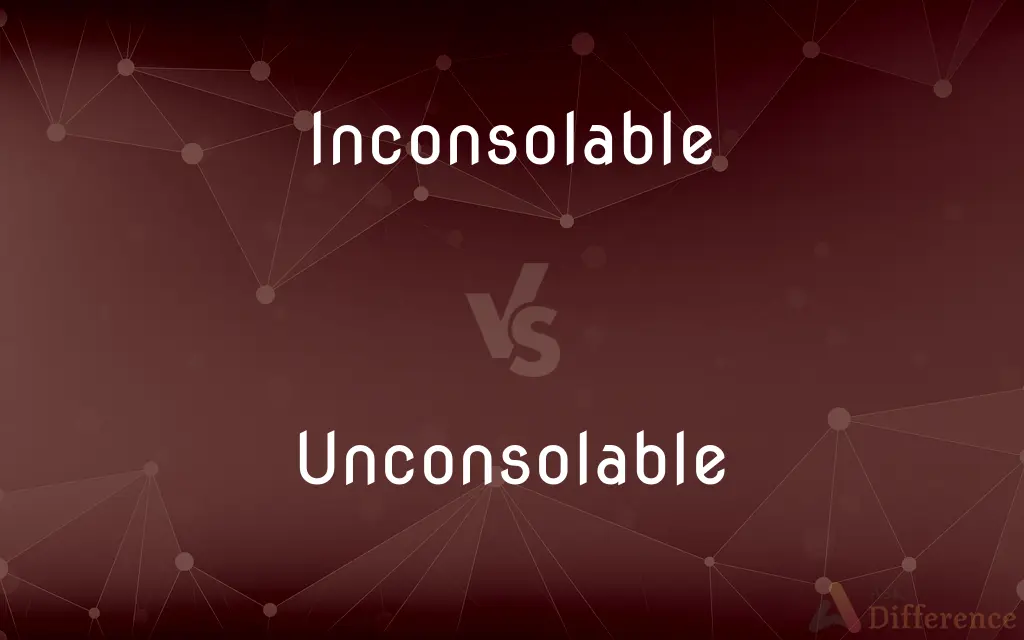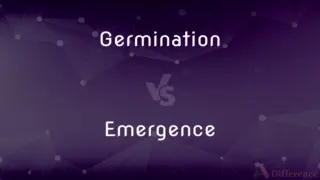Inconsolable vs. Unconsolable — What's the Difference?
By Fiza Rafique & Urooj Arif — Updated on March 25, 2024
Inconsolable and unconsolable both describe a state of grief or sadness that cannot be soothed, but "inconsolable" is the more commonly accepted term.

Difference Between Inconsolable and Unconsolable
Table of Contents
ADVERTISEMENT
Key Differences
"Inconsolable" is widely used to express a deep level of sadness or grief that cannot be alleviated by any means of comfort. It implies an intensity of emotion that is beyond the reach of solace. On the other hand, "unconsolable" conveys a similar meaning but is less commonly used in modern English. While it's understood, it might be considered less standard or archaic in some contexts.
The term "inconsolable" often appears in literature and daily communication, suggesting a universal recognition of its meaning and applicability in various emotional contexts. Whereas "unconsolable," though clear in meaning, might be seen in less formal or older texts, indicating a shift in preference towards "inconsolable" over time.
In the realm of nuances, "inconsolable" carries a slight connotation of an emotional state that is visibly profound and recognized by others as being beyond consolation. "Unconsolable," while technically similar, may not evoke the same depth of common understanding or usage, potentially leading to misunderstandings or the need for clarification in communication.
Linguists and writers often prefer "inconsolable" for its phonetic flow and historical prevalence in the English language, suggesting a choice that aligns with the conventional standards of expression. "Unconsolable" might be chosen for stylistic reasons or to evoke a particular nuance or tone in poetry, fiction, or creative writing, where the less common term might add a unique element.
The choice between "inconsolable" and "unconsolable" can reflect personal or stylistic preferences, especially in creative works where language is used to convey specific emotions or atmospheres. However, in formal writing and standard communication, "inconsolable" is generally preferred for its clarity and recognition.
ADVERTISEMENT
Comparison Chart
Usage Frequency
More commonly used
Less commonly used
Connotation
Deep, profound sadness
Similar meaning but might be seen as less standard
Preference in Literature
Favored for its historical presence and emotional depth
Used less, possibly for stylistic reasons
Recognition
Widely recognized and understood
May require clarification in some contexts
Application
Preferred in formal writing and standard communication
Might appear in less formal or creative contexts
Compare with Definitions
Inconsolable
Recognized for its use in serious contexts.
The news left them inconsolable.
Unconsolable
An alternative form expressing a similar inability to be comforted.
He was unconsolable after hearing the news.
Inconsolable
Expressing profound sadness that resists soothing.
The child's inconsolable crying touched everyone's heart.
Unconsolable
Less commonly used, but understood.
Her unconsolable grief was evident to all.
Inconsolable
Unable to be comforted or alleviated of grief.
After the loss, she was inconsolable for weeks.
Unconsolable
Can convey a similar depth of emotion, though less standard.
The unconsolable widow refused all visitors.
Inconsolable
Preferred in literature for its emotional depth.
The novel's hero remained inconsolable after the tragedy.
Unconsolable
Seen in less formal or older texts.
In his letters, he spoke of his unconsolable sorrow.
Inconsolable
Often used to describe deep emotional states.
His performance as the inconsolable father was remarkable.
Unconsolable
Might be chosen for stylistic variation.
The poet described the sea as unconsolable.
Inconsolable
"Inconsolable" is a song by American boy band Backstreet Boys. The song was released as the first single from their sixth studio album Unbreakable, which was released on October 30, 2007.
Unconsolable
Impossible or difficult to console.
Inconsolable
Impossible or difficult to console; despondent
Was inconsolable after his pet died.
Unconsolable
Not consolable.
Inconsolable
Not consolable; unable to be consoled or comforted, usually due to grief, disappointment, or other distress.
Unconsolable
Sad beyond comforting; incapable of being consoled;
Inconsolable when her son died
Inconsolable
Not consolable; incapable of being consoled; grieved beyond susceptibility of comfort; disconsolate.
With inconsolable distress she griev'd,And from her cheek the rose of beauty fled.
Inconsolable
Sad beyond comforting; incapable of being consoled;
Inconsolable when her son died
Common Curiosities
How is unconsolable different from inconsolable?
Unconsolable has the same meaning but is less commonly used and may be seen as less standard.
What does inconsolable mean?
Inconsolable describes a state of profound sadness that cannot be soothed.
Is unconsolable considered incorrect?
Not incorrect, but less standard and less commonly used than inconsolable.
Can both terms be used interchangeably?
Yes, in most contexts, but inconsolable is preferred for its wider acceptance.
In what contexts might one choose unconsolable over inconsolable?
For stylistic reasons or to evoke a specific tone in creative writing.
Why is inconsolable more commonly used than unconsolable?
Inconsolable is more established in the language and recognized for its emotional depth.
How should one decide which term to use in formal writing?
Inconsolable is preferred for its recognition and clarity.
How does the use of these terms vary by region?
Usage may vary slightly, but inconsolable is widely preferred in most English-speaking regions.
How do writers choose between these terms?
Based on the desired tone, stylistic preference, and emotional depth they wish to convey.
Does the choice between inconsolable and unconsolable affect the clarity of communication?
Generally, no, as both convey a clear meaning, but inconsolable is more immediately recognized.
Can the use of unconsolable be seen as archaic?
In some contexts, yes, it may give an impression of an older or more formal style.
Are there any synonyms that can replace inconsolable or unconsolable?
Yes, terms like heartbroken or grief-stricken can convey similar meanings.
Does the prevalence of inconsolable over unconsolable suggest a change in language?
Yes, it reflects language evolution and the standardization of terms based on common usage.
Is it important to understand both terms even if one is less used?
Yes, understanding both enriches language use and comprehension, especially in varied literary and communication contexts.
Might unconsolable carry a different emotional weight than inconsolable?
The emotional weight is similar, but the choice of term can subtly influence tone and style.
Share Your Discovery

Previous Comparison
Bill vs. Check
Next Comparison
Germination vs. EmergenceAuthor Spotlight
Written by
Fiza RafiqueFiza Rafique is a skilled content writer at AskDifference.com, where she meticulously refines and enhances written pieces. Drawing from her vast editorial expertise, Fiza ensures clarity, accuracy, and precision in every article. Passionate about language, she continually seeks to elevate the quality of content for readers worldwide.
Co-written by
Urooj ArifUrooj is a skilled content writer at Ask Difference, known for her exceptional ability to simplify complex topics into engaging and informative content. With a passion for research and a flair for clear, concise writing, she consistently delivers articles that resonate with our diverse audience.
















































